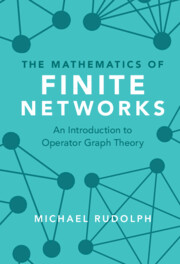Book contents
- Frontmatter
- Dedication
- Contents
- Preface
- 1 Introduction
- Part I Operator Graph Theory
- 2 Classical Graph Theory: The Mathematical Description of Networks
- 3 Operator Calculus: The Mapping between Vector Spaces
- 4 Operator Graph Theory: The Mathematics of Finite Networks
- Part II Applications
- Afterthought
- Bibliography
- Index of Notations
- Subject Index
4 - Operator Graph Theory: The Mathematics of Finite Networks
from Part I - Operator Graph Theory
Published online by Cambridge University Press: 30 April 2022
- Frontmatter
- Dedication
- Contents
- Preface
- 1 Introduction
- Part I Operator Graph Theory
- 2 Classical Graph Theory: The Mathematical Description of Networks
- 3 Operator Calculus: The Mapping between Vector Spaces
- 4 Operator Graph Theory: The Mathematics of Finite Networks
- Part II Applications
- Afterthought
- Bibliography
- Index of Notations
- Subject Index
Summary
Over the course of three centuries, the field of graph theory has matured from its initial conception as an abstract model for solving a rather specific mathematical problem into a powerful vessel for describing countless real-world phenomena, with applications now reaching far beyond applied mathematics. However, its static formalisation puts a number of limitations in place which hamper an advantageous utilisation of graph-theoretical concepts in circumstances which require a more dynamical perspective. Is it possible to overcome these limitations by challenging the classical notion of a graph? In this chapter, we will propose exactly such a challenge by considering a graph’s nodes and their relations as the result of operations performed on a set of suitable objects. This subtle yet consequential change in the conception of a graph not only delivers a more dynamic vantage point, but eventually generalises the very notion of a graph by structurally equating it with an abstract algebra. This chapter will introduce the basic notions and formalisations of an operator graph-theoretical framework and candidly argue for its potential merits and usefulness.
- Type
- Chapter
- Information
- The Mathematics of Finite NetworksAn Introduction to Operator Graph Theory, pp. 117 - 178Publisher: Cambridge University PressPrint publication year: 2022

